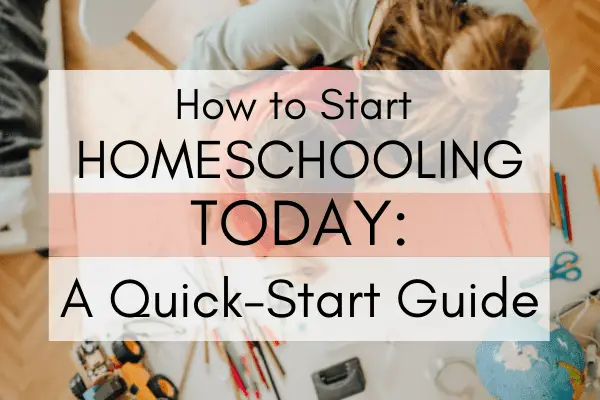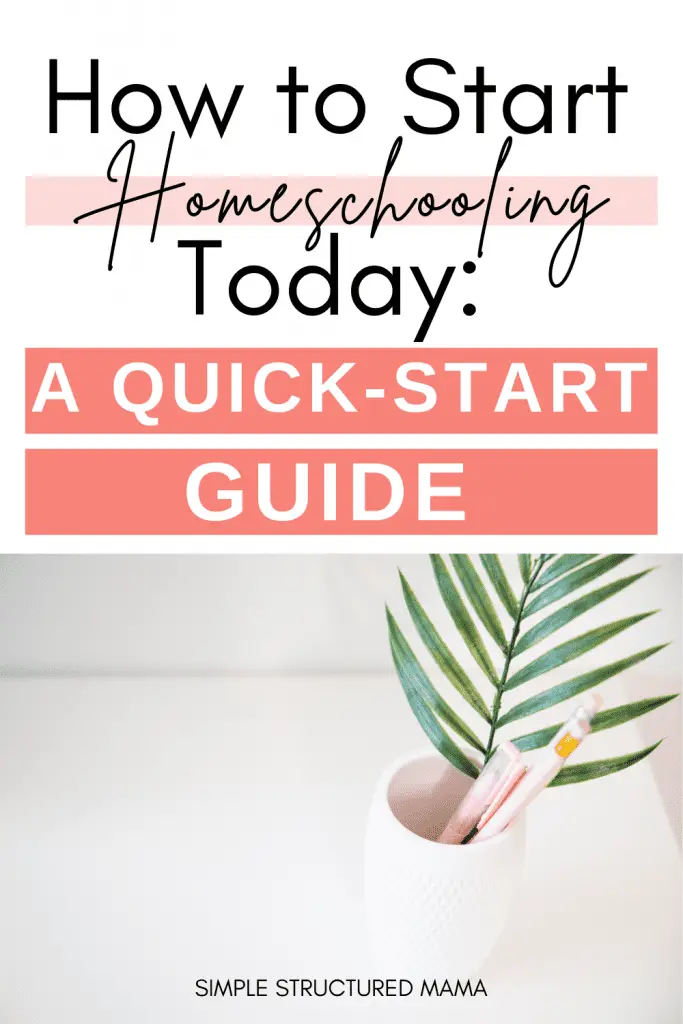
With homeschooling growing rapidly, many families are looking for ways to transition out of public, charter, and even private schools. Whether your goal is to provide a better environment for your kids, have more control over what they’re learning, or just take time to work on your connection, if you want to know how start homeschooling today, I gotcha covered.
Homeschooling is by no means a one-size fits all experience, and everyone’s homeschool setup is unique. However, there are things all moms can and should do to align with your vision and make it the most optimal experience for everyone.
I’m a firm believer of knowing what I’m getting myself into, so the fact that you’re here trying to educate yourself is one of the best things you can start out doing! There are moms who have both traveled this path before you and are in your shoes now. They can help you avoid pitfalls, provide direction, and fast-track your own self-education in how to start homeschooling your child.
I’m going to jam-pack this post with juicy, meaty tips on how to get started homeschooling your kids, but first I want to say something really important about homeschooling…
Homeschooling is a Calling
According to dictionary.com, a calling is defined as “a strong urge toward a particular way of life”. Homeschooling is a calling and not a job. You show up every day to a job, you do your work, and you get paid. However, as a homeschooling mom, you show up every day because you strongly believe in what you’re doing-even without a paycheck.
As a homeschooling mom, you wear multiple hats during the day and you arguably put in more hours than a typical 9-5. You need to know this. I don’t say this to discourage you, but to prepare you and help you avoid disillusionment. It can be done well, but I’m always in favor of painting a realistic picture of what you can expect.
You know what though? You can do this. You are already starting off right by educating yourself, so keep on reading to learn what you can do if you wanted to start homeschooling your kids today.
Tips for How to Start Homeschooling Your Child Today:
Put it in prayer
I personally believe in approaching life from a position of prayer so I’m not relying on my own strength, and homeschooling is no exception!
In my opinion, especially in today’s society, you can’t be with your kids all day every day and not be challenged and stretched. You need supernatural help from the Holy Spirit to carry you through, and guidance from His Word to walk in love and grace as you teach and train.
For more on this topic: The Holy Spirit: Every Mom’s Personal Helper
Check your local homeschool laws
One of the most important things to take into account when you decide to homeschool is the law. You gotta follow the law. You need to know legally what the requirements are for where you live so you don’t put your homeschool privilege at risk.
Some places (like here in Texas) have pretty lenient homeschool laws. However, other states and other countries have more strict homeschool laws. In some countries, homeschooling is even illegal!
Check your state homeschooling laws here
Check international homeschooling laws here
Likewise, be prepared to keep a detailed record of what you’re doing just in case you end up needing to produce this information. This will also be helpful if at some point life circumstances force you to make the decision to put your kids in school.

Find your people
Finding a homeschool community near you, or finding other moms you know and collabing with them (or at least meeting up for coffee every so often, or texting supportive messages to each other) can really help you, especially on those tough days.
It’s extremely beneficial to both get wisdom and share wisdom with other moms who are doing exactly what you are and can completely understand the challenges you may face. Now this is obviously not the very first thing you need to do if you wanted to start homeschooling your kids today, but it’s definitely important and something to keep in mind!
Prep yourself to deschool
If you’re pulling your kids out of any kind of school and making the transition to homeschooling, I would definitely advise you to spend time talking with your kids about what you’re doing, what it will look like, what they can expect, what is expected of them, etc. Marketing is everything, so be excited with how you present information to them (even if you’re still unsure about what you’re doing!).
Some of your kids might be less than excited about being homeschooled, while others may be thrilled. For those who aren’t excited about it, here are a few perks homeschoolers enjoy that you can throw their way:
- Later start times
- Shorter academics time
- More time to spend on skills, projects, or outdoors
- No stress surrounding schoolwork
- More time freedom as they get older to get a job and still get schoolwork done
You can also plan fun days like field trip days, coffee shop days, poetry tea times with other homeschool friends, and more, especially once you get the swing of things! If your kids are anything like mine, they’ll love and look forward to days like these.
Choose a curriculum
This is an obvious one, but one of the most important things you’ll do is choose a curriculum. If you were going to homeschool starting today, you could easily create a piecemeal curriculum virtually for free. Here’s what I would do in that situation:
- Go to the library and check out lots of books-good quality literature and history books. You can require older ones to read and narrate to you what they’ve read (to strengthen memory, comprehension, and recall), and read to younger ones. I like to read to all of my kids during lunchtime. Many libraries also carry some kind of learn-to-read curriculum like Hooked on Phonics and readers for kiddos who are just learning how to read.
- Google some math worksheets based on where your kids are at. You can print out several to give your kiddos enough work for a few days.
- Print out some good poetry and/or Scripture verses to memorize. Memorizing is a super good skill to help your kids develop! This can also be done with addition, subtraction, multiplication, and division facts.
- Utilize online help! Consider creating an account at Khan Academy for free online lessons in many subjects. If you have older kiddos, consider purchasing courses from SkillShare or Udemy to give them some new skills to build or projects to complete.
- If you’re not quite comfortable with the idea of teaching your kids just yet, and/or you have multiple children and you want to give yourself more time to figure out a plan, consider enrolling them in a full online school like K12.
This will allow you more time to be able to examine other curricula, such as those with biblical foundations. Currently, we use and love both The Good and the Beautiful and ACE. We’ve also liked and used Rod and Staff (one the least expensive options I’ve encountered).
You can also check out homeschool curriculum reviews to help you choose a curriculum. But please, for the love of mental health, don’t overcomplicate this or feel like you need to have the best, most expensive curriculum out there-there are plenty of good ones for decent prices.
Depending on your kids age level and where you live, you could also go to local store that carries homeschool curriculum and get some basic workbooks to hold you over while you research.

Stock up on homeschooling supplies
Obviously, you’ll need a decent amount of school supplies. Here’s a quick list to get you started:
- Pencils and extra erasers
- Highlighters
- Pencil sharpeners
- Notebooks, binders, and folders
- A large box of crayons or several smaller boxes of crayons
- A homeschool caddy to hold supplies for everyone (I like to have ours in the middle of the table when we’re working)
- Post It notes
- A homeschool planner for you (I like this homeschool planner from Mardel)
- Student planners for your older kids (consider this student homeschool planner)
Have a kickoff party or a first day celebration
Having a kickoff party is obviously not necessary, but it would be a nice touch to get your kiddos (and yourself) excited about your homeschool journey. This may especially be helpful for kids who aren’t exactly thrilled about homeschooling.
Maybe you don’t have time to throw a party, especially if you’re deciding to start homeschooling today, but you can do something fun like go out for ice cream, go to the park, go out for lunch, or another special activity when you’re done with academics for the day!
Assess your homeschool situation
When you start homeschooling, the obvious first things to think about are homeschool schedules and curriculum. However, it’s equally important, especially for your mental health, to assess your homeschool situation. How many kids and what ages are you working with? How much can you afford to spend right now on curriculum? Are you working from home full-time or part-time? Do you have a special needs child?
Likewise, you also need to know yourself. Are you a pretty patient person, or do you blow your top easily? Are you organized, or do you need help in this area? Do you have good management skills? Do you have good connections with your kids?
All of these things will make your homeschooling situation unique, and I believe it would greatly benefit you to recognize these things and be realistic about them before you start. It will help you better accept where you are and not compare yourself to another mom whose background, financial situation, and personality are different than yours.
Just as every homeschool setup is different, every homeschool mom’s journey is unique. Where one mom is strong, another mom may need lots of growth. Keep at it, and keep doing what you need to do to grow!
Get your expectations straight
As you assess your homeschool situation, it would benefit you to take some time to write out what your expectations are. Alongside of all the academic stuff, if you’re gonna start homeschooling today, this is just as important of an issue to figure out.
- What do you expect from yourself as a homeschool mom? (include things like how mentally and emotionally present you expect yourself to be, consistency, schedules, activities, etc).
- What do you expect from your kids? (include things like daily routines, sibling relationships, staying on top of schoolwork, chores, etc).
- And most importantly, are these expectations realistic? Knowing yourself and your current mental, emotional, spiritual, financial, and physical condition, as well as your relationship with your kids, are you able to realistically fulfill these expectations?
I’ve had to revisit my expectations many times over and scale back more and more. I have a tendency to try to do too much, and when I feel like I’ve lost patience for everyone and everything, it’s usually because I’m still trying to do too much or push too hard.
“Homeschooling has highs and lows and when you have a bad day it is helpful to remember that great homeschooling days are not a place you get to when you have the right schedule, the right curriculum, or the right methods to your day. Everyone will have bad days. Everyone will have good days. It is part of the package.”
Eclectic homeschool
Read more: Homeschool Schedules: What’s Realistic and What’s Not
Create a homeschool vision
Remember how I said homeschool is a calling? With a calling comes a vision.
Why are you homeschooling? Did God call you to do this? And if so, what is the vision He’s given you for it?
Are you trying to better your relationships with your kids? Lay a better foundation for a potentially better adulthood? Tailor their academic learning to align with your family’s belief system?
Whatever the reason, it’s extremely helpful for you to have a vision to look back on, pray through, and help you get back on track when times get hard.
Well! You came here for tips on how to homeschool starting today, and I hope I gave you plenty to get you going! Blessings on your journey!
